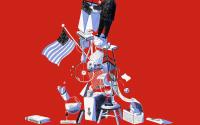The government said Tuesday it is moving closer to approving meat and milk from cloned animals, drawing protests from consumer groups.
The Bush administrationis currently reviewing Food and Drug Administration plans to regulate cloned animals and food derived from them, the agency said in a statement. A draft of the plans should be released by the end of the year, FDA said.
The agency has "studies that show that the meat and milk from cattle clones and their offspring are as safe as that from conventionally bred animals," the FDA statement said.
The biotech industry says cloning lets breeders do what they've always done: select the best animals from the herd for reproduction.
"Cloning allowing the possibility of identifying the healthiest and the superior sires or boars that are going to be used for breeding purposes," said Barb Glenn of the Biotechnology Industry Organization.
A fight is brewing over whether food from cloned animals must carry special labels.
"We feel like the average consumer is going to accept this technology as we move forward," Glenn said. "There will not be a label that will indicate this is anything other than healthy meat and milk."
Dairy producers are worried about what might happen if "clone-free" products start showing up in supermarkets.
"We have concerns where people are going to try to draw distinctions and differences where none exist," said Chris Galen, spokesman for the National Milk Producers Federation.
The federation opposes putting cloned milk on the market, at least until it's proven safe. Galen said producers worry it could interfere with widely held beliefs among consumers about the wholesomeness of milk.
The Washington-based Center for Food Safety said food labels should disclose that it came from cloned animals. Concerns over hormones and antibiotics have helped drive ever-growing demand for organic food, said Joseph Mendelson, legal director of the Center for Food Safety.
"Because consumers are not getting the specific product information, it will impugn the whole conventional market," Mendelson said.
The Consumer Federation of America said years of independent polling, including a survey by the Gallup organization and the Pew Initiative on Food and Biotechnology, indicate that consumers oppose animal cloning and wouldn't buy cloned meat and milk even if the government declared them safe.
In contrast to the dairy industry, beef producers are watching with interest but haven't taken a position. The major beef group, the National Cattlemen's Beef Association, sees potential in cloning.
"Our guys are all about new technology, starting back with artificial insemination to embryo transfer," said Leah Wilkinson, the beef association's food policy director. "This is just another one of those assisted reproductive techniques. This one's got some potential to help us in the consistency area."
Consumer acceptance of that tool is "definitely something we will be watching," Wilkinson said.
She said it's important to make a distinction between food that comes from cloned animals and food that comes from their offspring.
"The key thing is, it would be the offspring of clones that would be going into the food supply," she said. "Our ranchers are not going to spend $20,000 to clone an animal and then put it into the food supply."






